The young man from Guinea-Conakry (this is how the people of the region refer to the country of Guinea whose capital city is Conakry, in order to distinguish it from its neighbour, Guinea-Bissau, whose capital is Bissau) who took us on his taxi to Gare Voyegeurs (Nouadhibou Railway Station) had ambitions of Europe. He had made good progress having moved his way north to his current taxi duty in Nouadhibou. Many people like him used the nearby Canary Islands (belonging to Spain) as a stepping stone to follow their European dream, but recent tightening of controls had made that route difficult. We wished him well in his quest as we got off at the lonely building in the middle of nowhere in the afternoon sunshine with an hour to go before the scheduled departure time of the fabled Iron Ore train to Zoeurat.
The Iron Ore train brings ore from the mines in Zouerat to Nouadhibou port. The railway line is owned by the SNIM company that operates the train. There are a few services every day with the empty train returning back to Zouerat after unloading its cargo at Nouadhibou. Since there is no road network between Nouadhibou and Zouerat (and the town of Choum on the way), people depend on this train for travel. To accommodate them, there is one passenger car at the tail end of the long train. It is said to be the longest train in the world (almost 3 km long). People have the option of buying a ticket and riding in the passenger car or riding free on the iron hoppers. The hoppers will be empty on the Nouadhibou-Zouerat route. The railway tracks stretch east-west along the Mauritania-Western Sahara border for 200 km before turning north at a right angle and following the border north between the two countries.
Our plan was to disembark at Choum (which lies at the apex of the right angle) and get on a shared 4x4 taxi to Atar, capital of the Adrar region which is the spiritual and historical center of Mauritania. The historical centers of Ouadane and Chinguetti along with opportunities to explore the Mauritanian Sahara make Adrar an interesting region to explore. The alternative route to travel to Adrar is to go down the coastal highway to Nouakchott and then head northeast on the paved highway to Atar. The extra length of travel on this route is compensated for by the relative comfort of a good road.
At Nouadhibou station, there were a couple of people sitting outside in the shade and the interior seemed nicely furnished with airport style seating for passengers. On one side of the hall were three rooms, one each for a store, ticket office and police control. The shopkeeper doubled up as ticket vendor and opened the middle door in order to take our money in exchange for two bits of paper. With our limited French and his limited English, we established that there were no assigned seats (this we expected based on reports from past travelers). On the other side of the hall were the toilets (locked) and a mosque. There were only a handful of people inside leading us to believe that we may not encounter the crazy stampede into the single passenger car on the train when it is time to board. We walked out in the sunshine to examine the "platform" which was just desert sand on both sides of a pretty wide track. Donkey carts and praying men could be seen on one side.
Minutes before the scheduled departure of 3 pm, we picked our bags and headed to the shop window to ask the man if it was time to head outside to board. We got an incredulous expression in response. Huh? What? Oh, the train? (Yes, the train for which you took our money a half-hour ago in exchange for tickets, that train) Maybe 7' o clock! His companions shook their heads and pursed their lips. The man continued, We don't know, maybe 7 or 8 or 9. You just wait outside! At least, this is what it sounded like in our amateur French-English translation attempt.
Thankfully, someone opened the toilet doors. A young man went inside the mosque and issued the call for prayer without aid of loudspeaker and some others followed him. Several cars arrived outside and departed at random over the next few hours. How did these people know that today's train was not leaving at 3 pm? Everyone who arrived inside greeted everyone else heartily as if they were one family. We did not see any other foreigners and could not establish a connection with anyone there. So we waited and tried working on our blog posts.
In the hours leading upto darkness, a sizable crowd had gathered in the hall. A couple of policemen arrived and earned their salary by summoning us to the third room and carefully examining our passports and noting it down in their ledgers. As darkness approached, we tried to make another inquiry and one of the men in the store said "Douce" (twelve in French) and held up ten fingers forcing us to give up on future such attempts. Then, we saw the first foreigner, a young woman, other than us in the hall. Her companion saw us and spoke the first words in English we had heard that afternoon. "The train leaves at 7:30", he told us. A few minutes later, there was some commotion and it was evident some new information had come to light. Our English speaking friend told us, "One more hour! Leaving at 8:30. We are going to town for some coffee. Want to join us?" We opted to stay back and declined his extraordinary offer to bring some coffee for us.
We drew out a fall back plan in case M manages to board the train and V gets left behind on the "platform". M would carry on till Atar and V would get to Atar via Nouakchott. Also, we agreed that if one of us felt uncomfortable while boarding the train, we would abandon the idea and get back to town and figure out alternatives. Of course, once the train started moving, we have to stay the course as there is no option of getting off part way in the desert.
With darkness came the wind and it was too cold to stand outside. The only light near the tracks came from the headlights of cars parked nearby. Several people had already taken position on both sides of the tracks. Back inside, a group of women in traditional melafas befriended us and gestured for us to stay close to them when it was time to board. If these ladies were willing to rough it on the train, hardy travelers like us should not have too much anxiety, right? Right?
At 8:15 pm, there was a big commotion and everyone headed out into the darkness. We stayed close to the women as they had indicated. From the darkness, a loud noise with accompanying headlight announced the train. It sped past the standing people and several empty iron hopper carriages sped past. Eventually, they all passed and the final few carriages that had enclosed spaces approached as the train slowed down (How did the driver know where to stop since he was 2 or 3 km. away from the last car?). The lone passenger car was the last one at the tail end of the train. We got confused by the two carriages preceding that and tried to board those but were sent off to the last one. Several young men had jumped on the last carriage even as it was approaching. Everyone else crowded around the two doors. It was completely dark inside the car.
We stuck with the crowd and eventually managed to haul ourselves up into the carriage. It had compartments but they all seemed to be full. The passageway was full of people. Baggage was being loaded through the windows and shoved into the compartments. There was much yelling in the darkness with some loud arguments. After a certain point we could not move forward as all the space in the passageway seemed to be taken with people and bags. People were pushing and shoving from both sides. While the first fallback plan for getting separated no longer applied, the second fallback plan to abandon the trip was no longer possible as there was no way we would get out. We resigned ourselves to a long night standing on the passageway of the train. The journey to Choum was expected to take upto 12 hours. Looking on the bright side, we would arrive at Choum at dawn rather than at the scheduled (?) 2 am.
Something had to give, and it did. Someone ahead on the passage gestured to M to get into the compartment in front. M managed to stumble past people and luggage and disappeared inside. V was not sure if the same courtesy was extended to him and stayed put till he heard M's voice asking him to follow. He managed to wade his way in and literally "fell" into the dark compartment. The scene inside (lit only by a handheld battery lamp) was dreamlike. Miraculously, M was seated by the far window on what seemed to be a throne. Each side of the compartment had three adjacent "thrones". M's throne was a bare wooden board with the seat and back cushions long gone. Next to M were two ladies and young boy seated comfortably covered with duvets. On the opposite side was our English speaking friend who instructed V to take the seat next to him. And handed two well packed cups of coffee to both of us! Within 5 minutes, we had gone from standing in the passageway with our packs on our backs to being seated among friendly people and a cup of (now cold) coffee. The shouting and yelling went on as baggage was still being loaded from outside through the windows. After a few adjustments, we even managed to deposit our bags on the luggage racks above us.
With a sickening lurch, the train moved forward and we were off. The people in the passageway (mostly young men or boys) had settled down into standing or sitting on luggage. Within a few minutes, we managed to accommodate two more people in the compartment, first a woman and then a young boy who promptly disappeared beneath the covers on the floor and went to sleep. M moved from her window position and sat next to V. We learnt later that the couple (to be referred to as S and F) had actually paid for extra seats to travel in comfort but ended up sharing it with us and the others. They seemed well prepared for the trip with extra mattresses that served as padding for the seats which had shed their cushions long ago. Despite S being a Mauritinian, this was his first time on this train even though it appeared to us that he was a seasoned Iron Ore Hopper. They were planning to get off at "Ben Amera" which was 60km earlier than Choum and explore some "mountains" in the area. When they asked if we would like to join them, it did not take long for us to agree, this being an opportunity to visit a remote region not mentioned in the guidebooks.
The carriage was open to the elements with the glass windows that closed only half-way. The train's progress was slow (30 kph or so) but this was enough to bring the wind chill factor inside. A change in speed would result in the car being savagely hurled in one direction or the other and those standing without support would find themselves in somebody else's lap. Heavy baggage fell frequently from above us adding to the excitement. At some point, someone outside asked if the boy who went to sleep on the floor was ok, setting off a frantic search for him beneath the blankets and mattresses. Everyone was relieved to find him and doing pretty well, blissfully asleep beneath all those layers in the midst of all the chaos around him. What a gift to be able to sleep through this! To us, the next ten hours was spent trying to protect ourselves from the tentacles of the cold desert wind that seemed to know the exact way to get to our skin. And to think that the true Iron Ore train adventure is to travel in the open on the hoppers.
The phrase "Time stood still" is just a poetic device. It never does and a good thing it is too. Especially on journeys like this. The morning duly arrived and we squeezed our way past the bodies on the passageway and jumped off the end of the train in the darkness before dawn. S told us that the train was not supposed to stop there but only did so on his request! Within the minutes, the train departed and the 4 of us were left standing by the side of tracks. While it was cold in the desert, the wind chill caused by the train's motion was mercifully absent.
A half-kilometre walk along the tracks brought us to a small settlement. The two of us and F (being obviously foreigners) had to submit to passport check by police stationed outside the village. S made inquiries and managed to find a place with a roof and place to sleep on the floor. Just as dawn was breaking, we went off to sleep. We had done our bit on the great Iron Ore Train and lived to tell this story.
Google Maps Link

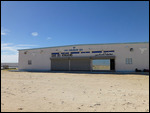
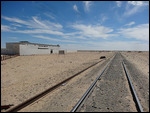
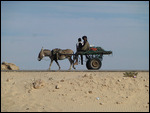
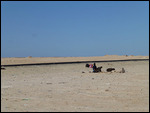
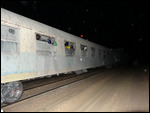
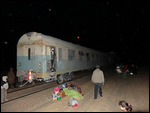
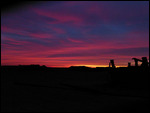

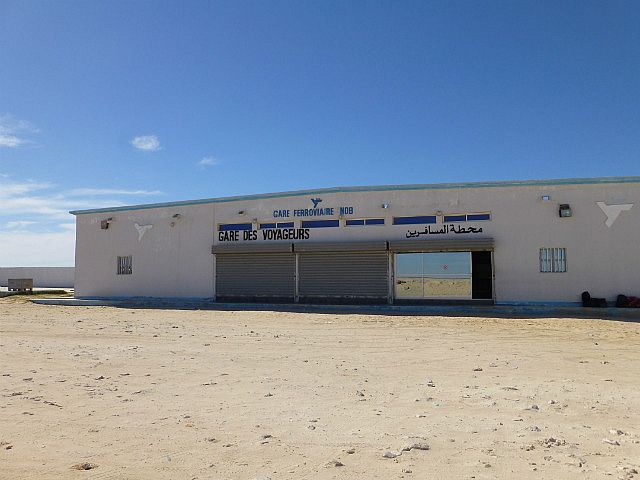
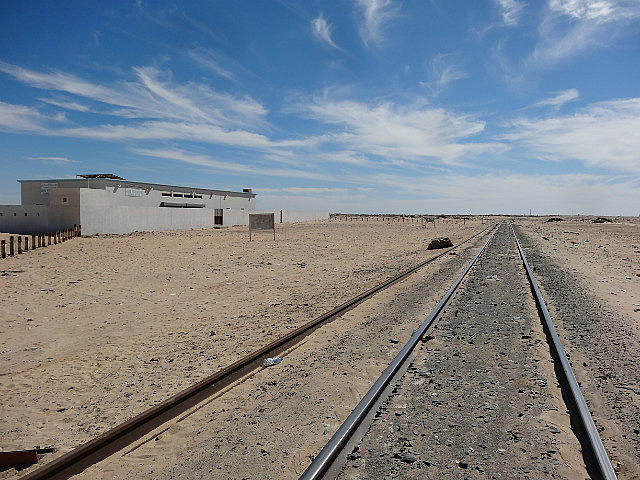
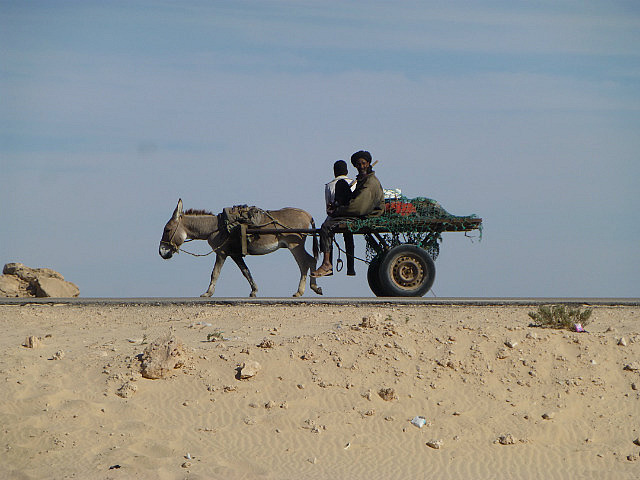

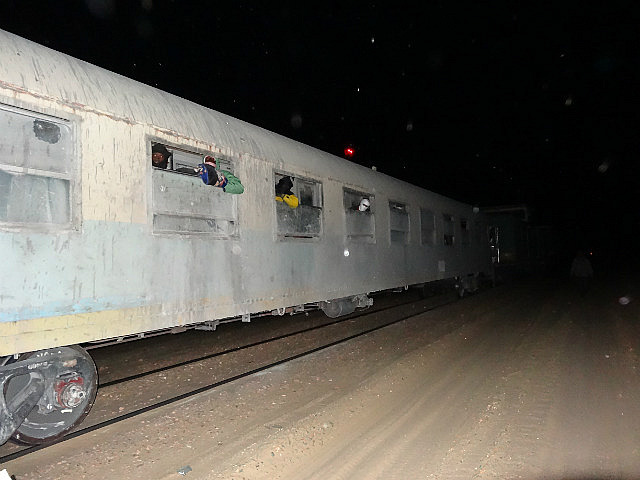
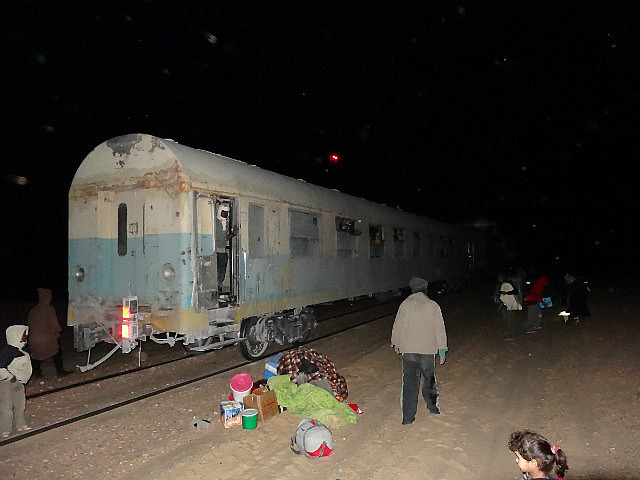
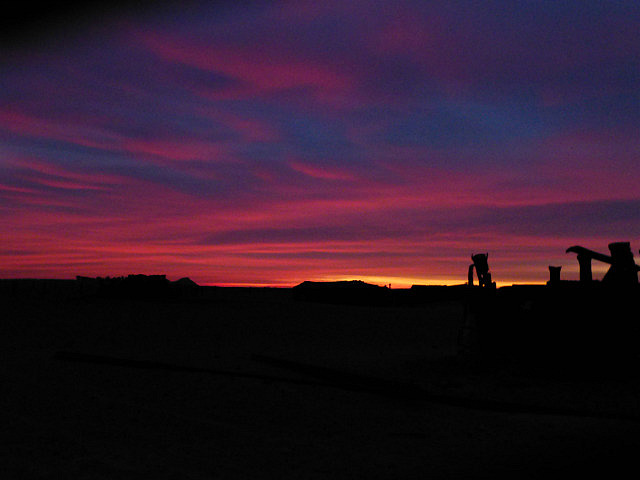
Comments